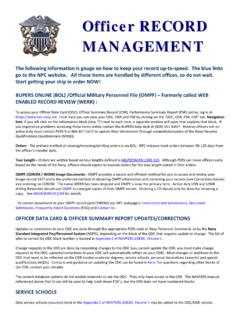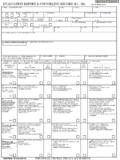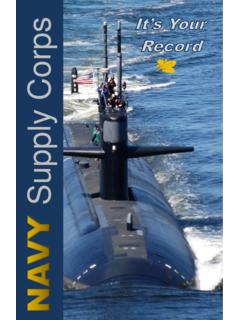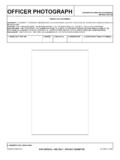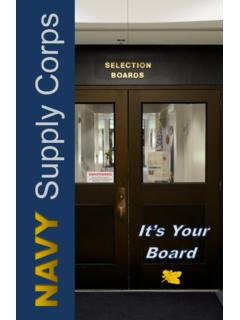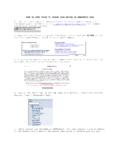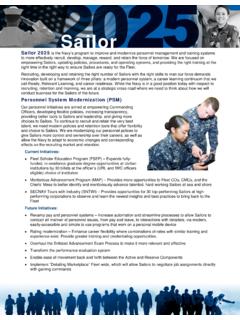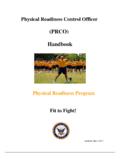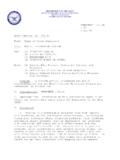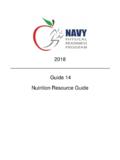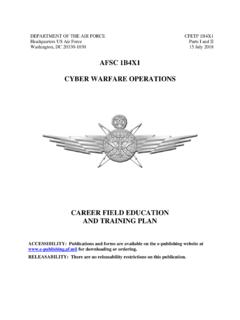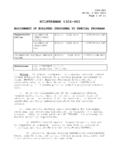Transcription of PLAIN TALK FOR SAILORS - U.S. Navy Hosting
1 1 PLAIN TALK FOR SAILORSU pdated January 25, 2015On time advancement is the key to a successful career. It also is key to Navy retention programs, including Career Waypoints (CWAY). Use the information provided on this page to prepare for and take your next Navy Wide Advancement actions will help you succeed? Verify eligibility to take the exam. Follow the direction of your Educational Services Officer (ESO), Personnel Support Detachment (PSD), and/or your chain of command. View the current NAVADMIN with exam dates and rating-specific information on the Navy Personnel Command (NPC) website at: Click New Messages (on the right) and search for EXAMINATIONS . Obtain your Bibliography and references. Log in to Navy Knowledge Online (NKO) at Under the Career Management heading, click Navy Advancement Center . On the same page, view the appropriate Bibliography for Advancement for your upcoming exam. On the same page, view Rating Topics / Subtopics for your rating and paygrade.
2 Some references may be found on NKO. Use the Organizations & Communities drop-down menu (in the gray bar at the very top of the NKO homepage) to select Navy Ratings . When the page opens, locate your rating and click to view rating-specific information. If you are unable to locate a reference, request assistance from your supervisor. Develop and execute your study plan. Break information into manageable chunks. Schedule and maintain a routine (plan for 30-60 minute study periods). Start several months ahead of time and stick to your plan. Study individually, with a partner, and/or with a study group. Preview Read Review Request on-the-job training (OJT) and demonstrations from subject matter experts. Ask for help when you need it. Be prepared for exam day. The day before your exam, get a good night s sleep; eat a light breakfast on exam day. Be early, bring your military ID, leave your cell phone behind. During the exam, take your time, remain calm and deliberate, and trust your knowledge.
3 Read each exam question carefully, and answer every question. Double-check your answer sheet before turning it in. View exam results. Advancement results are posted on BUPERS Online (BOL) at Your profile sheet is posted on Navy Knowledge Online (NKO) at Under the Career Management heading, click Navy Advancement Center then click Advancement Profile Sheet .Do you want more detail?The steps provided above will help you prepare for and take your Navy advancement exam. For greater detail, more information, and recommended best practices, review the following to prepare for and take theNavy Wide Advancement Examination (NWAE)2 The following pages provide detailed information that will help increase your opportunity to perform well on the advancement your eligibility for advancement For all candidates, E4-E9, eligibility is determined by Navy Advancement Policy which is provided by BUPERS (series) ( enlisted Advancement Manual) and applicable NAVADMIN. You must meet all eligibility requirements for the next higher rate.
4 You must meet your service in paygrade (SIPG) requirement and be recommended for promotion by your commanding officer (CO). Certain ratings and rates have additional mandatory requirements established in the cycle NAVADMIN. If your rating requires a security clearance, your status must be current or your exam will be invalidated. Prior to exam day, follow the direction of your Educational Services Officer (ESO), Personnel Support Detachment (PSD), and/or your chain of command; verify and sign your advancement worksheet; verify the exam date, time, location and required materials, and sign your worksheet. IMPORTANT: Your worksheet must be accurate and completed, as it affects your Final Multiple Score. For E7 candidates, when exam results are released, a profile sheet is generated that displays Selection Board eligibility status. Candidates must fix exam discrepancies prior to the Selection Board convening date. Candidates with exam discrepancies will not be reviewed by the : Eligibility for an in-theater waiver is NOT automatic.
5 To be considered by the Selection Board, your parent command must request that the Navy Advancement Center create a profile sheet for the current advancement cycle. For E8 and E9 candidates, although advancement does not require taking an exam, a profile sheet reflecting selection board eligible is required. Verify that you have a current profile sheet; if you do not, there is something wrong with your eligibility for Selection Board review. Investigate immediately!IMPORTANT for E7/8/9 candidates: If you receive a profile sheet that reflects selection board eligible, be aware that your eligibility status is continuously reviewed by your command and PERS-802 and can change. Therefore, you must periodically verify your status. If your status changes from selection board eligible to an invalidated status, your profile sheet will be updated, but you will not be notified. If you do not have a profile sheet reflecting selection board eligible when the Board convenes your record will not be reviewed by the your Bibliography and ReferencesWhat is a BIB?
6 Your Bibliography (BIB), in addition to your Topics and Subtopics lists, provides a road map for developing your advancement exam study plan. Each BIB is exam-specific and provides a listing of all the references used to develop your advancement exam. BIBs are posted six months prior to exam administration. There are 175 questions on your exam: 25 professional military knowledge (PMK) questions and 150 rating technical questions. Technical exam questions are developed by Fleet subject matter experts (SMEs) in your rating community during an Advancement Examination Readiness Review (AERR) Conference. For each question, Fleet SMEs reference the content to a published source from your rating s Advancement Exam Reference List or your PMK Advancement Exam Reference List. The question is verified to ensure the answer is correct and the information is generally available to all SAILORS . Questions are then selected for an exam. Each reference used for a specific exam is compiled, and the entire list becomes your exam : If a reference is listed on your BIB, then you can expect to see exam questions regarding information contained within the reference.
7 Obtain the current Bibliography for your rating and paygrade. Log in to Navy Knowledge Online (NKO) at Under the Career Management heading, click Navy Advancement Center . View the appropriate Bibliography for Advancement (BIB) for your upcoming exam. On the same page, view Rating Topics / Subtopics for your rating and paygrade. Obtain references listed on your BIB. Some references can be found on To locate enlisted rating communities of practice in NKO, use the Organizations & Communities drop-down menu (in the gray bar at the very top of the NKO homepage) to select Navy Ratings . When the page opens, locate your rating and click the hyperlink to go to your community. If you are unable to locate a reference, request assistance from your supervisor. Verify references used to create your exam questions. Make sure you have every reference listed for your rating and paygrade. Occasionally, a reference may be updated or deleted. Revisit NKO periodically to verify that your BIB has not changed.
8 If it has changed, compare your original BIB with the revised one and adjust your study plan as needed. Study for your Advancement ExamHuman beings learn in different ways, so it is important that you develop a study plan that is both comfortable for you and effective. The recommendations listed below can be used when you study by yourself, when you study with a partner, and/or when you study with a group. You should engage all methods that enable you to be knowledgeable, confident and prepared on the day of your exam. Develop your study plan. Review references and determine how much time you need to cover each one. Organize references into similar topics and subtopics. Break information into manageable chunks. Determine whether you intend to study alone and/or with a study group. Use a calendar to schedule individual and/or group study periods leading up to the exam. Plan short study periods (no more than one hour each) and schedule regular breaks to reduce fatigue and to keep your mind sharp.
9 Schedule your most difficult material for times when you are mentally at your best; schedule easier material for when you are mentally less efficient. Create a positive study environment. Choose a location where you can concentrate. Study at the same time and in the same place. Eliminate distractions, such as loud music, TV or other people. Eat light meals and drink water instead of highly caffeinated drinks. Take regular breaks (at least one per hour), stand up and stretch, jog in place, complete a few push-ups, anything to keep your energy level up and your mind alert. Use proven study Preview the chapter by reading just the title, headings, and subheadings. Examine pictures, diagrams, tables, or graphs. Read the introductory and concluding paragraphs and the summary, if one is included. Turn each title, heading, and subheading into a question about the material you will be Do not try to read a reference from cover to cover. Focus on one topic at a time. Give attention to underlined, italicized, or bold words.
10 Make notes about the text in your own words. Read out-loud to yourself to increase understanding and retention of hard topics. Reread sections that contain difficult or confusing information. Write down questions about information that you do not understand and ask for help when information is confusing or Request on-the-job training (OJT) to reinforce the information you have learned from BIB references and study sessions. Request demonstrations from your supervisor. Request training from subject matter experts for Topics/Subtopics that you need to understand Review what you have read at the end of each section in the chapter. Create a summary sheet of highlighted material and review frequently. Make flashcards from your notes or create a study sheet to help memorize formulas, numbers, vocabulary, and so forth. Associate what you ve read with something familiar. (Relating new ideas to what you already know helps improve understanding and retention.) Utilize learning tools such as using a song, poem or anagram to help you recall hard-to-remember information.
